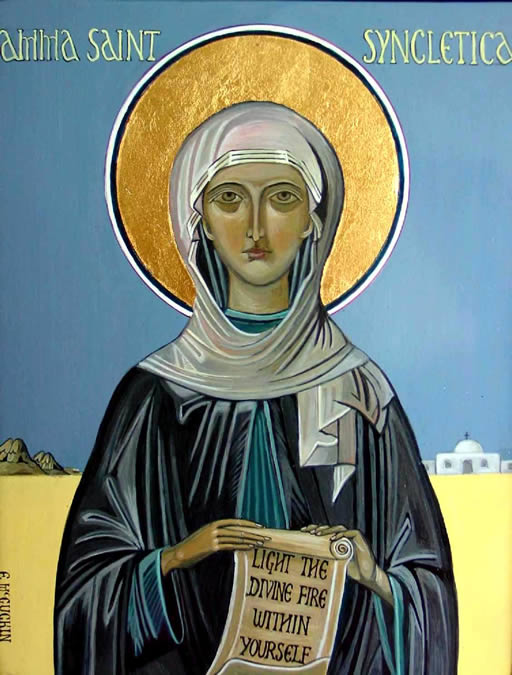
Macrina the Younger began one of the earliest monastic communities at her family's estate in Annisa near the Black Sea. It eventually became known as the "School of Virtue" with the men gathered on one side of the river Iris and the women on the other.
The communities worshipped together in a shared church, prayed the psalms throughout the day, cultivated gardens for quiet and meditation and prayed the Evening Office of Thanksgiving as the lamps were lit.
The communities supported themselves through manual labor and Macrina, herself, baked the community bread as well as the bread for Eucharist. Her personal wealth was administered by another and was used to feed the poor.
As she approached death, Macrina's bed was turned toward the East in anticipation of the resurrection. She stopped speaking to others and spoke only to God, in prayer. Her brother, Gregory of Nyssa, sat with her and heard her final prayer to God:
Macrina's Prayer
It is you, O Lord, who have freed us from the fear of death. You have made our life here the beginning of our true life. You grant our bodies rest in sleep for a season and you rouse our bodies again at the last trumpet.
You have given in trust to the earth our earthly bodies, which you have formed with your own hands, and you have restored what you have given, by transforming our mortality and ugliness by our immortality and your grace.
You have delivered us from the curse of the law and from sin, by being made both on our behalf. You have broken the dragon's head ~ that dragon who seized man by the throat and dragged him through the yawning gulf of disobedience. You have opened for us the way of resurrection, after breaking the gates of hell, and have destroyed him that had the power of death.
You have given as a token to those who fear you the image of the holy cross, to destroy the adversary and to bring stability to our lives.
Eternal God, for whom I was snatched from my mother's womb, whom my soul loved with all its strength, to whom I consecrated my flesh from my youth until now, entrust to me an angel of light, who will lead me by the hand to the place of refreshment, where the "water of repose" is, in the bosom of the holy patriarchs.
May you, who cut through the fire of the flaming sword and assigned to paradise him who was crucified with you and entrusted to your pity, remember me too in your kingdom, because I too have been crucified with you; from fear of you I have nailed down my flesh and have been in fear of your judgements.
May the terrible gulf not separate me from those whom you have chosen, nor may the malignant Enemy set himself across my path, nor may my sin be discovered in your sight, if having error through the weakness of our human nature, I have committed any sin in word or deed.
May you who have power on earth to forgive sins, forgive me, that I may draw breath and that I be found in your presence, "having shed my body and without spot or wrinkle" in the form of my soul, and that my soul may be innocent and spotless and may be received into your hands like incense in your presence.
As evening drew near and the lamps were lit, members of Macrina's community began the Evening Office of Thanksgiving in her presence. As the prayers concluded, Macrina sighed deeply and died.
Saint Macrina the Younger (324 - 379) was born at Caesarea, Cappadocia. Her parents were Basil the Elder and Emmelia, and her grandmother was Saint Macrina the Elder. Among her nine siblings were two of the three Cappadocian Fathers, Basil the Great and Saint Gregory of Nyssa, as well as Peter of Sebaste. Her father arranged for her to marry but her fiance died before the wedding. She devoted herself to her religion, becoming a nun.
She became well known as a holy woman and instructed many young women religiously. For this she is honored as one of the most prominent nuns of the Eastern Church. She had a profound influence upon her brothers with her adherence to an ascetic ideal. Gregory of Nyssa wrote a work entitled Life of Macrina in which he describes her sanctity throughout her life. Her brother Gregory composed a "Dialogue on the Soul and Resurrection" (peri psyches kai anastaseos), entitled ta Makrinia to commemorate Macrina. Her feast day is the 19th of July.

No comments:
Post a Comment